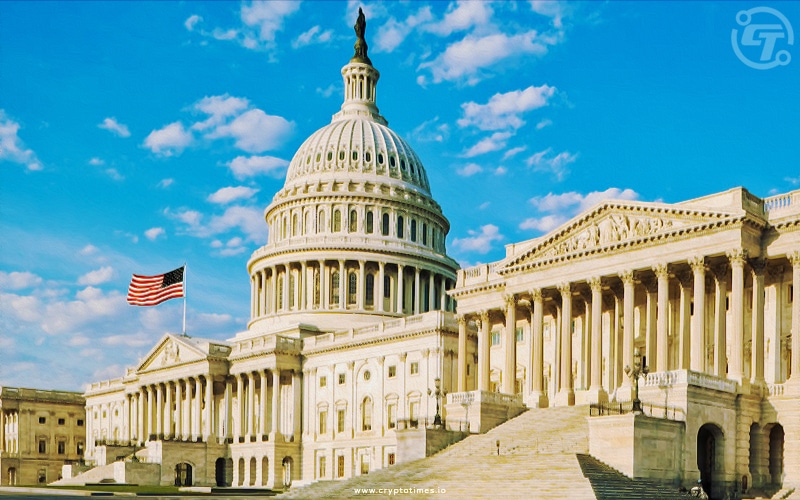In Brief:
- Crypto firm CEOs demanded that lawmakers develop a clear crypto regulatory framework.
- CEOs of Circle, Coinbase, Paxos, Bitfury, FTX, Stellar testified before the congress.
- Democrats expressed suspicion about the financial risks connected with crypto trading, while Republicans urged caution in implementing new legislation.
Six CEOs from key crypto firms testified before the House Financial Services Committee united in their call for lawmakers to create a clear regulatory framework for cryptocurrency.
The meeting was titled “Digital Assets and the Future of Finance: Understanding the Challenges and Benefits of Financial Innovation in the United States.” The firms who testified discussed the issues their firms faced as both stablecoin issuers and digital asset platforms.
The committee asked questions ranging from the security benefits of blockchain technology to the potential for cryptocurrency to increase financial inclusivity.
The hearing saw participation from Circle CEO Jeremy Allaire, Paxos CEO Chad Cascarilla, Stellar Development Foundation CEO Denelle Dixon, Bitfury CEO Brian Brooks, Alesia Haas, the chief financial officer of Coinbase and CEO of its U.S. subsidiary, and FTX CEO Sam Bankman-Fried.
The hearing drew more than a hundred thousand viewers in the House Financial Services Committee’s stream . It was a historic moment for the cryptocurrency industry.
The hearing was organized by the House Financial Services Committee, which is headed by Rep. Maxine Waters, with the goal of enhancing lawmakers’ understanding of crypto assets and how they fit into existing regulations.
Ms. Waters stated, “Currently, cryptocurrency markets have no overarching or centralized regulatory framework, leaving investments in the digital-asset space vulnerable to fraud, manipulation, and abuse.”
Other nations, notably Canada, have approved products like a Bitcoin ETF while the US continues to prohibit them, the committee members and crypto executives argued.
Excessive regulation of cryptocurrency, according to Rep. Patrick McHenry of North Carolina, could push technical development to other nations, putting the United States at a handicap.
“We don’t need knee-jerk reactions by lawmakers to regulate out of fear of the unknown rather than seeking to understand,” he said. “That fear of the unknown and the move to regulate before understanding will only stifle American ingenuity and put us at a competitive disadvantage,” he stated.
The executives said that cryptocurrencies do not fit well into the current system of US financial regulations and that lawmakers should examine customized regulations for the sector.
Alesia Haas and other executives expressed a strong desire for a future without the SEC as their regulator. The SEC’s approach, according to Bitfury Group CEO Brian Brooks, is a hindrance to crypto startups.
Brooks stated, “What happens in the United States is you have a new crypto project and you walk into the SEC and you describe it in great detail and you ask for guidance and they say, ‘We can’t tell you, and you list it at your own peril.”
Democrats expressed suspicion about the financial risks connected with cryptocurrency trading, while Republicans urged caution in implementing new legislation.
However, both parties expressed concerns about whether quantum computing could jeopardize blockchain security and whether cryptocurrency could endanger the dollar’s status as the world’s reserve currency.
Congresswoman Nydia Velázquez urged Circle and Paxos’ CEOs to confirm that all of their backings were in cash or Treasury bills before securing their support for federal requirements. The CEOs agreed to do that.
Several policymakers are concerned that the crypto market’s explosive expansion poses a threat to financial stability.
They claim that the market is rampant with scams, that bitcoin mining wastes huge amounts of energy, and that malicious actors use crypto to avoid taxes and resist anti-money-laundering laws.
The session indicated a wide gap in how to approach the sector. The internal divisions suggest that getting Congress to agree on comprehensive legislation to overhaul the regulation of digital assets could take years.
Circle Chief Executive Jeremy Allaire stated after the hearing, “I think it went really, really well. It was very comprehensive, not contentious.”
FTX CEO Sam Bankman-Fried, along with others expressed his desire of not having SEC as their regulator. FTX released a document with a set of principles and proposals to assist policymakers in developing a crypto regulatory framework just days before he was scheduled to appear in front of Congress.






